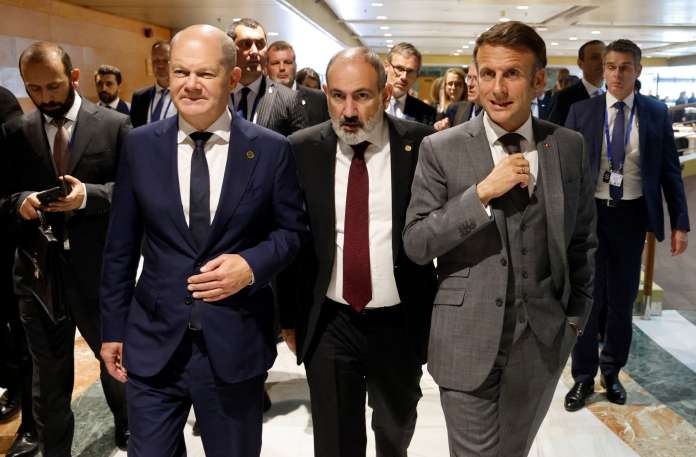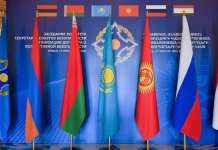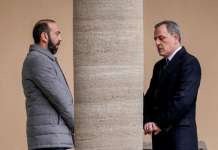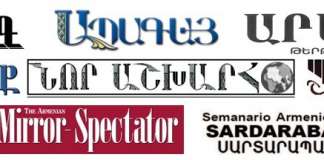Azerbaijan’s refusal to attend a summit orchestrated by Emmanuel Macron is casting doubt on the French president’s diplomatic effectiveness in reaching peace agreements, as relations between Baku and Paris sour rapidly, Bloomber reports.
Macron had hoped to get Azerbaijani President Ilham Aliyev and Armenian Prime Minister Nikol Pashinyan to sit at the same table for talks in Granada, Spain, on Thursday, where some 45 European leaders are gathered for a forum he designed to foster dialogue on the continent. Aliyev canceled his visit hours after his ally Turkish President Recep Tayyip Erdogan also pulled out.
“France doesn’t have a problem with Azerbaijan, it’s Azerbaijan that has a problem with the commitments it makes, with keeping its word and respecting international law,” a combative Macron told reporters during a news conference in Granada, saying that he planned to call Aliyev soon. “We will continue acting as a mediator every time we can,” he said, while also ruling out sanctions against Azerbaijan as “counter-productive.”
Aliyev told Macron that Paris couldn’t be a neutral partner given its ties to Armenia, according to people familiar with their exchanges, who asked not to be identified because the information isn’t public. Macron believes Aliyev assured him Azerbaijan wouldn’t take military action against Armenians in Nagorno-Karabakh shortly before it launched a lightning assault last month to take full control of the region, the people said.
Aliyev’s foreign policy adviser Hikmet Hajiyev said on X, formerly known as Twitter, Thursday that Azerbaijan supported three-way talks with Armenia and the European Union, without the involvement of France.
He blamed “France’s biased actions and militarization policy that seriously undermine regional peace and stability in the South Caucasus,” and accused Paris of refusing to allow Turkey to join the talks in Spain. Macron denied the accusation.
Despite Aliyev’s absence, Pashinyan met with Macron, German Chancellor Olaf Scholz and European Council President Charles Michel in Granada on Thursday. Michel said Aliyev and Pashinyan agreed to meet with him later this month in Brussels.
While Azerbaijan’s attack effectively ended a 35-year territorial conflict over Nagorno-Karabakh, it triggered an exodus of almost the entire Armenian population of the territory. More than 100,000 fled to Armenia in a matter of days, fearing for their safety even as Aliyev pledged to respect their rights if they stayed.
France, which has a large Armenian community mostly descended from survivors of the 1915 genocide in Ottoman Turkey, has repeatedly clashed with Azerbaijan on the conflict.
Macron’s foreign minister, Catherine Colonna, promised to provide Armenia with military equipment “so that it can ensure its defense” during a visit to Yerevan on Tuesday. She also made a plea for support to Armenia during a phone call between US President Joe Biden and European leaders to discuss Ukraine, according to a French diplomat.
Macron’s government wants the United Nations to be let into Nagorno-Karabakh and for the European Union to do more to support Armenia’s sovereignty, including via the European Peace Facility which also reimbursed governments for military deliveries to Ukraine, one of the people said. The French also want to help Armenia reduce its dependence on Russia, the person added.
It also wants the EU to do something in response to Baku’s use of force. Both sanctions and use of the EPF are seen as premature at this stage, another person said.
Azerbaijan allowed a UN delegation to visit Nagorno-Karabakh on Sunday. It later reported that it came across no incidents of violence against civilians, while also noting that there were “very few” people left.
France wants to “build a real European plan to support an independent Armenia that’s sovereign and democratic,” Prime Minister Elisabeth Borne said Tuesday. “France is fully committed to Armenia’s sovereignty and territorial integrity.”
Macron and the EU are concerned over a potential military assault by Azerbaijan, the people said. Aliyev is pushing for a transport corridor across southern Armenia to link Baku to Azerbaijan’s exclave of Naxcivan, bordering Turkey and Iran, a demand that Yerevan fears may be a threat to its sovereign territory.
Michel said Aliyev “made very clear that they do not have territorial claims on Armenia” during a phone talk between them two days earlier. “It should be said in a very vocal way I think,” the EU leader told reporters Thursday.
The informal group meeting in Spain, known as the European Political Community, brings the 27 EU member states together with countries including Ukraine, Moldova and the UK. One of the key objectives Macron set out for the forum is to help resolve international crises by engaging the EU more with non-members to foster a common culture.
Serbia and Kosovo are set to hold talks with Macron and Scholz in Granada. The French and German leaders in June demanded new elections in North Kosovo following contested results, though the conflict remains.
















